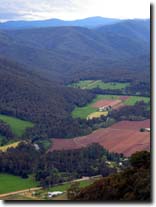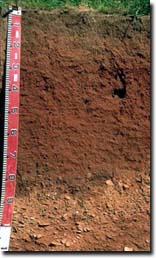
Back to: Contenders for State Soil
Why should the Red Dermosol be Victoria’s State Soil?
- What soil could be more Victorian than a soil typical of the higher parts of ‘Kelly Country’ where it is widespread. Red Dermosols occur mainly in the higher rainfall areas of the state, particularly in the North East region of Victoria. Here they occur on a range of landscapes from lower river terraces to mountains.
- Red Dermosols occur in the upper catchments of some of our most important river systems including the Campaspe, Loddon, Goulburn-Broken, Yarra, Ovens, King and Murray systems and are important in the initial filtering of water entering some of the states key water resources.
- A diverse range of land uses are conducted on Red Dermosols - from meat and dairy production to red wines of the high country, that reflect the rich red character of this soil.
- The Red Dermosol is a well structured, well drained soil, usually with no obvious physical limitations to root growth resulting in a physically fertile and productive soil - characteristics you look for in a representative of the strengths in your state.
- The Red Dermosol represents a wide range of soils formed within a range of climates and on a diverse set of landscapes and parent materials - reflecting the diversity of the State.
| 
Red Dermosols occur on a range of landscapes in the North East region of Victoria - from lower river terraces to mountainous areas. |
Any reasons why this soil should not be Victoria’s State Soil?
- Red Dermsols are not uniquely Victorian and do not occur to a greater extent than for other Australian states.
- There is an underlying dark side to this soil in the often insidious occurrence of soil acidity particularly in the subsoil, which is of significant concern to those involved with the management and production of this soil.
Typical soil profile
This example is of a Red Dermosol that occurs on a lower river terrace of the Tallangatta Creek in north-east Victoria.
| 
Red Dermosol on lower river terraced. |
| Surface Soil |  |
| A1 | 0-10 cm | Dark brown; fine sandy clay loam; very strongly acid (pH 4.9) |
| A2 | 10-20 cm | Yellowish red; fine sandy clay loam; strongly acid (pH 5.5) |
| Subsoil |  |
| B21 | 10-30 cm | Dark red; light clay (fine sandy); medium blocky structure, parting to fine blocky structure; strongly acid (pH 5.1) |
| B22 | 30-50 cm | Dark red; light clay (fine sandy); strongly acid (pH 5.3) |
| C | 75-130 cm+ | Alluvial gravels |





